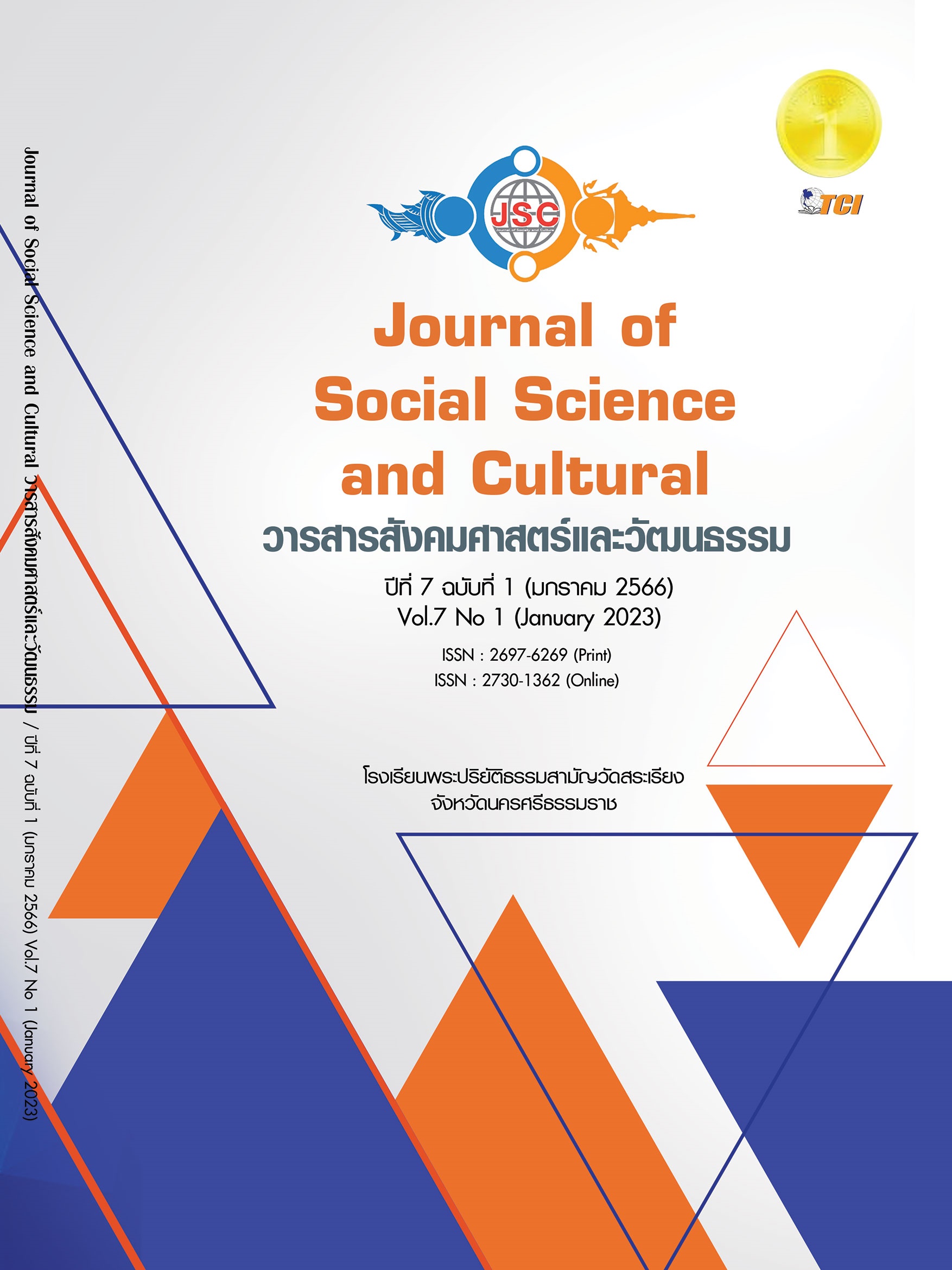EFFECTS OF GROUP REALITY THERAPY COUNSELING ON REDUCING STRESS AND ENHANCE POSITIVE PSYCHOLOGICAL CAPITAL OF THE ORPHANS IN YALA
Main Article Content
Abstract
The article aspired to study the effects of reality therapy group counseling for reducing stress and enhancing the positive psychological capital of orphans in Yala Province. The research was quasi-experimental. The sample group was ten orphans who studied in the academic year 2022 at Darul Eh-San Kero Institute for Islamic, Kero Subdistrict, Raman District, Yala Province, and were between 15 - 18 years old. They had an intermediate level of stress and a low level of positive psychological capital and were willing to participate in group counseling. They were selected by purposive sampling. The research instrument consisted of 1) the Suan Prung Stress Test (SPST-20) from the Department of Mental Health, 2) the positive psychological capital test with a reliability equal to .80, and 3) the reality therapy group counseling program for reducing stress and enhancing positive psychological capital ten times with the period 1 hour 30 minutes each time. The statistics in the research included Percentage, Mean, Standard Deviation, and the Wilcoxon Signed Rank Test, a non-parametric statistical hypothesis test, to compare the stress level and the positive psychological capital before and after joining the reality therapy group counseling. The research results indicated that 1) the stress level of the orphans in Yala decreased after joining the reality therapy group counseling with a statistical significance at the .01 level, and 2) the positive psychological capital of the orphans increased after joining the reality therapy group counseling with a statistical significance at the .01 level.
Article Details
References
จัตวา ชุณหบุญญทิพย์. (2562). การศึกษาความสัมพันธ์ระหว่างความมุ่งมั่นสู่เป้าหมายกับผลสัมฤทธิ์ทางการเรียนโดยมีทุนทางจิตวิทยาเชิงบวกเป็นตัวแปรคั่นกลาง : กรณีศึกษานักศึกษาชั้นปีที่หนึ่งมหาวิทยาลัยเทคโนโลยีราชมงคลอิสาน วิทยาเขตขอนแก่น. ใน เอกสารนำเสนอการประชุมวิชาการครุศาสตร์อุตสาหกรรมระดับชาติ ครั้งที่ 11. กรุงเทพมหานคร: วิทยาเขตขอนแก่น.
ดวงมณี จงรักษ์. (2556). ทฤษฎีการให้การปรึกษาและจิตบำบัดเบื้องต้น. (พิมพ์ครั้งที่ 6). กรุงเทพมหานคร: สมาคมส่งเสริมเทคโนโลยี (ไทย-ญี่ปุ่น).
เทอดพงษ์ แตงไทย และคณะ. (2564). ผลการปรึกษาทฤษฎีเล่าเรื่องต่อความเครียดเชิงวิชาการของนักเรียนมัธยมศึกษาตอนปลาย. วารสารการวัดผลการศึกษา, 38(103), 184-194.
ปิยะฉัตร สมบูรณ์ และคณะ. (2564). การศึกษาผลการให้คำปรึกษากลุ่มแบบบูรณาการเพื่อเสริมสร้างทุนทางจิตวิทยาของนักเรียนโรงเรียนราชประชานุเคราะห์ 39 จังหวัดนราธิวาส. วารสารสังคมศาสตร์และมานุษยวิทยาเชิงพุทธ, 6(6), 122-138.
วรวุฒิ เจริญศิริ. (2564). ภาวะเครียดในเด็ก. เรียกใช้เมื่อ 10 กุมภาพันธ์ 2564 จาก https://www.babybbb.com/article_detail.php?nid=204
สำนักงานพัฒนาสังคมและความมั่นคงของมนุษย์จังหวัดยะลา. (2564). รายงานสถานการณ์ทางสังคมจังหวัดยะลา. เรียกใช้เมื่อ 17 มกราคม 2565 จาก http://yala.m-society.go.th/
สุรเชษฐ์ กานต์ประชา. (2562). การออกแบบการวิจัย รูปแบบการวิจัยเชิงปริมาณ. ใน เอกสารนำเสนอโครงการฝึกอบรม “สร้างนักวิจัยรุ่นใหม่” (ลูกไก่) หน่วยงานมหาวิทยาลัยนเรศวร รุ่นที่ 7. จังหวัดพิษณุโลก: มหาวิทยาลัยนเรศวร.
อรุณทิพย์ หงส์พิทักษ์ และกาญจนา ไชยพันธุ์. (2558). ผลการให้คำปรึกษาแบบกลุ่มตามแนวทฤษฎีเผชิญความจริงต่อการเห็นคุณค่าในตนเองของวัยรุ่น. วารสารศึกษาศาสตร์ ฉบับวิจัยบัณฑิตศึกษา มหาวิทยาลัยขอนแก่น, 9(1), 211-221.
Berens, A. & C. Nelson . (2015). “The science of early adversity: is there a role for large institutions in the care of vulnerable children?”. The Lancet, 386(9991), 388-398.
Luthans, F. et al. (2007). Psychological Capital: Developing the Human Competitive edge. Bangkok: Oxford University Press.
Wubbolding, R. E. (1995). Integrating theory and practice: Expanding the theory and use of the higher level of perception. Journal of Reality Therapy, 15(1), 91-94.


